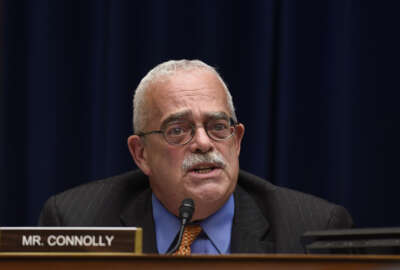

The comprehensive 2018 spending bill drawn up by lawmakers Wednesday night doesn't include any additional funding for the Trump administration's plan to build a new...
Best listening experience is on Chrome, Firefox or Safari. Subscribe to Federal Drive’s daily audio interviews on Apple Podcasts or PodcastOne.
The comprehensive 2018 spending bill drawn up by lawmakers Wednesday night doesn’t include any additional funding for the Trump administration’s plan to build a new FBI headquarters in downtown Washington, D.C.
The $1.3 trillion omnibus spending deal, which would fund agencies for the rest of the current fiscal year, and would avert a government shutdown at midnight Friday, also sets higher budgets for many of the agencies targeted for cuts by the White House.
“The Act does not include funding for the revised Headquarters consolidation plan released on February 12, 2018, because many questions regarding the new plan remain unanswered, including the revision of longstanding security requirements and changes to headquarters capacity in the national capital region,” lawmakers wrote in an explanation of the omnibus spending bill. “Until these concerns are addressed and the appropriate authorizing Committees approve a prospectus, the Committees are reluctant to appropriate additional funds for this activities,” lawmakers wrote.
Last month, the General Services Administration scrapped a decade-long plan to build a new consolidated FBI headquarters in suburban Maryland or Virginia.
Instead, GSA proposes demolishing the J. Edgar Hoover building in D.C. and building a new headquarters in its place.
The Trump administration’s new direction for the FBI headquarters has met strong opposition from Maryland and Virginia lawmakers.
Earlier this month, GSA Inspector Carol Ochoa said her office will review the agency’s sudden reversal on plans for the FBI headquarters.
The IG’s review came at the request of Rep. Gerry Connolly (D-Va.) after he said he received insufficient explanations from GSA about the new FBI headquarters plan.
The omnibus bill includes $370 million for FBI construction projects beyond the D.C. metro area.
Chris Van Hollen (D-Md.), a member of the Senate Appropriations Committee, reportedly pushed for language in the spending bill that would block any new funds to the FBI headquarters proposal, an aide told Federal News Radio.
On Monday, Sen. Ben Cardin (D-Md.) expressed doubt that the new FBI headquarters plan would get the green light from Congress, after House and Senate lawmakers at committee hearings raised concerns about the security of the Hoover building site, as well as the cost efficiency of the new headquarters plan.
“They can’t do anything without congressional approval. I’m hopeful that Congress will weigh in and say, ‘You have to have A, B, C, D and E, which will be impossible at the Hoover building,’ and we’ll get back on track to looking at the three sites that were previously identified,” Cardin told Federal News Radio after a town hall meeting at the Census Bureau’s headquarters.
Before her retirement from office, former Sen. Barbara Mikulski (D-Md.), a leading voice in the Senate Appropriations Committee, lobbied hard for building a consolidated FBI campus in Landover, Maryland or Greenbelt, Maryland.
A third proposal would have built a new FBI campus in Springfield, Virginia.
The 2018 spending bill keeps the Environmental Protection Agency at its current budget of more than $8 billion, walking back the White House’s request last year to cut the agency’s budget by nearly a third.
Congress also appears to throw cold water on the Trump administration’s ongoing effort to reorganize the agency.
“The agreement does not include any of the requested funds for workforce reshaping. Further, the Committees do not expect the Agency to consolidate or close any regional offices in fiscal year 2018,” lawmakers wrote in their explanation of the spending bill.
Earlier this year, the EPA announced it would shutter some regional offices in Las Vegas and Grosse Ile, Michigan. In both cases, the agency cited a memo from the Obama administration to reduce the government’s real estate footprint.
Lawmakers also put the brakes on “large-scale adverse personnel actions or incentive programs in fiscal year 2018,” such as layoffs or another round of buyouts and early retirements at the EPA.
Despite the move from lawmakers to avoid agency reductions, John O’Grady, the president of the American Federation of Government Employees (AFGE) Council 238, which specifically represents EPA employees, said the budget still leaves the agency in dire straits.
“That’s not to say that morale is wonderful now at EPA. Perhaps in some ways, employees are disappointed that they won’t get a check going out the door, but at least it prevents a mass exodus of experience and talent at a time when the Agency has already been cut to the bone,” O’Grady wrote in an email to Federal News Radio.
The omnibus bill sets the IRS’ budget at $11.4 billion, nearly a $200 million increase from its current funding.
Last year, the Trump administration proposed cutting the agency’s budget down to $10.975 billion.
Of that total, Congress has set aside $320 million that must be used to implement the tax reform plan that the president signed into law late last year.
Within the IRS budget, Congress plans to give the agency more than $2.5 billion for its taxpayer services division, nearly a $300 million increase from what the Trump administration proposed in last year’s budget proposal.
Four months after the bill takes effect, the IRS must report to the House and Senate appropriations committees on its effort to improve its level of service on its taxpayer hotline and its taxpayer assistance centers.
The bill also provides $110 million for IT systems modernization at the IRS.
Tony Reardon, the president of the National Treasury Employees Union, called the omnibus bill a “step in the right direction” for an agency that has lost more than $900 million and more than 21,000 employees over the last eight years.
“This modest increase for the IRS will allow the agency to be more responsive to taxpayers and employers who need help from the professional public servants who answer the phones and staff the Taxpayer Assistance Centers,” Reardon said.
The omnibus bill significantly ramps up funding for the Census Bureau, which typically receives a larger budget in the years leading up to every decennial count.
The spending bill gives the agency a $2.81 billion budget, compared to the $1.5 billion budget President Donald Trump proposed in last year’s budget proposal.
According to appropriators, 70 percent of the 2020 census costs will happen between fiscal 2019 and 2020. Last year, Commerce Department estimated that the 2020 count will cost approximately $15.6 billion.
Phil Sparks, the co-director of the Census Project, said the omnibus bill gives the agency the funding it needs it enters the final stretch for the 2020 count.
“The dismal trend of many years of underfunding 2020 Census preparations has finally been reversed with bipartisan support in Congress. Our assessment is the bureau now has the minimum resources needed to prepare for its Constitutional mandate. However, the FY 2019 funding level will be critical, and supporters of a full, fair, and accurate count will remain vigilant,” Sparks said.
Congress plans to give the Education Department more than $3.9 billion dollars beyond its current funding levels, bringing its budget up to $70.9 billion.
The budget standards in stark contrast to the $59 billion budget the Trump administration proposed for the last year, $9 billion or 13 percent reduction.
Copyright © 2025 Federal News Network. All rights reserved. This website is not intended for users located within the European Economic Area.
Jory Heckman is a reporter at Federal News Network covering U.S. Postal Service, IRS, big data and technology issues.
Follow @jheckmanWFED


